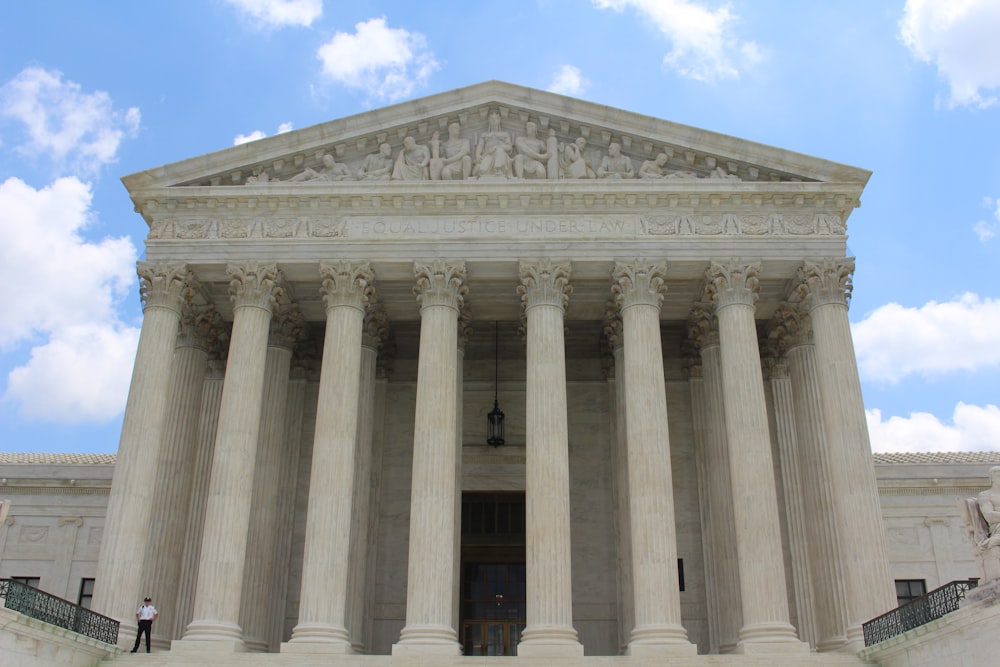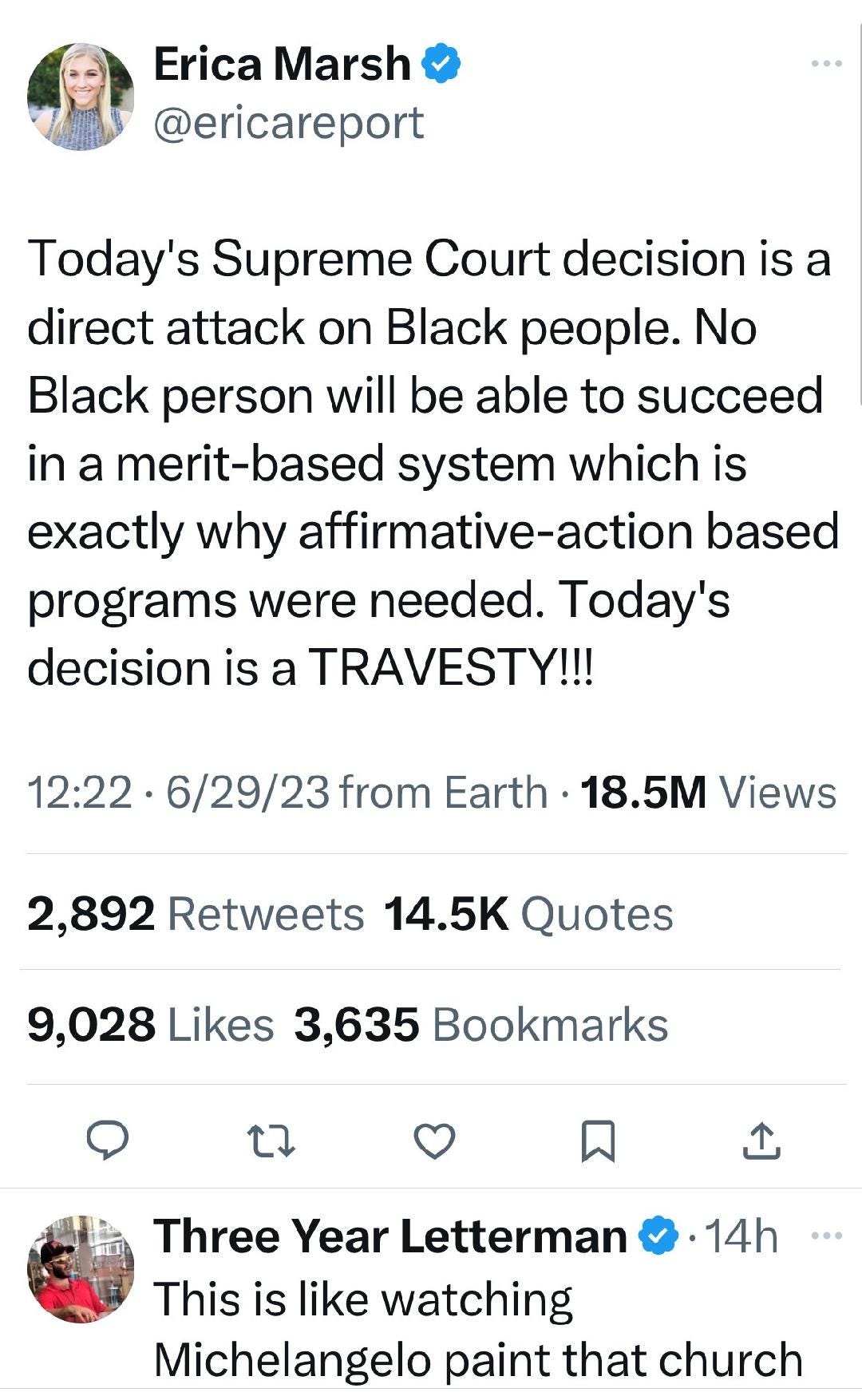SCOTUS strikes again
Two new rulings on race and religion
The Supreme Court made waves again this week with two landmark decisions issued on Thursday. The Court broke new ground on both affirmative action and religious rights in what are sure to be two controversial rulings.
In Students for Fair Admissions v. Harvard College, the Court held that Harvard, in a case that included a similar lawsuit against the University of North Carolina, could not use race-based criteria in admissions. The ruling set off a seismic shock in the news world that rivaled last year’s Dobbs decision on abortion.

Writing for the 6-3 majority (divided exactly as you’d expect with a concurrence by Thomas and a dissent by Jackson), Chief Justice Roberts said, “We have permitted race-based admissions only within the confines of narrow restrictions. University programs must comply with strict scrutiny, they may never use race as a stereotype or negative, and—at some point—they must end. Respondents’ admissions systems—however well-intentioned and implemented in good faith—fail each of these criteria. They must therefore be invalidated under the Equal Protection Clause of the Fourteenth Amendment.”
This seems to be a difficult but valid truth. Roberts points out that the admissions programs themselves engage in racial stereotyping which “is contrary to the ‘core purpose’ of the Equal Protection Clause.” He further notes that 20 years ago in Grutter v. Bollinger, universities were put on notice that racial profiling for admissions should end within 25 years, yet the schools seem to have taken no steps to phase out the programs.
When affirmative action began in the 1960s, we were a very different country. Separate but equal was still the law of much of the land and minorities, particularly blacks, were considered second-class citizens in almost the entire country.
Today, America is still imperfect but has come a long way. Racism exists but equal-protection laws have driven it underground. The share of black and Hispanic Americans who are in the middle class rivals that of whites. Many minorities have management jobs, both in government and the private sector, and we’ve had a black president. A popular one.
On the other hand, blacks still lag behind whites in college degrees and attendance. There are other problem areas as well. There are far fewer black corporate executives than their share of the population would lead us to expect.
This leads to a few questions. One is why, after 60-something years of affirmative action in colleges, minority students still trail whites. Perhaps we have reached a point of diminishing returns or at least one where more of the same isn’t going to fix the problem.
The second question is how affirmative action is ever to be phased out. Some would probably prefer that it never go away. Some just don’t want to make the decision for fear of a backlash.
Ultimately, the bottom line is that if affirmative action has not achieved parity in half a century, it is unlikely that it ever will. The Supreme Court, after giving a heads-up two decades ago, has now decided to rip off the bandaid.
The 14th and 15th Amendments make clear that dividing America racially is unconstitutional. It took a century after ratification for those amendments to be fully realized, and that has been a problem. I am of the opinion that government-mandated segregation must be resolved by government-mandated integration. But at some point, the government mandates need to go away and Americans need to manage their interpersonal relationships for themselves.
As Ronald Reagan said, “Nothing lasts longer than a temporary government program.”
I don’t know if the authors of affirmative action 50 years ago thought that these programs would still be in force today. I also don’t know if they would think that they are still needed today, given the changes that America has seen in the past five or six decades.
I’m not saying that minority students should be thrown to the wolves, but they can be reached by different means than official affirmative action programs. New, colorblind programs should focus on students who come from the poorest parts of our society. Means-testing would help to ensure that aid goes to students who truly need it rather than middle- and upper-class families who can check the correct race box. Maybe a geographical checkbox would pass judicial muster.
At this point, the ruling only seems to impact college admissions, but it may be a harbinger of things to come in other areas of affirmative action. Could we see similar rollbacks in primary and high schools and even the business world? I think that is likely and if I were a manager in one of those areas, I’d be paying attention to the Court’s words.
The core issue is that the Constitution prohibits racial discrimination and we’ve been allowing it - for very good reasons - for a very long time. The constitutional issues in the Harvard case are clear. Affirmative action had to end. The only question was the timing.
The issues were not as clear in the other big case, Groff v. DeJoy. I profiled this case back in April and wrote that I couldn’t imagine that the Court would rule in favor of Groff, the mail carrier who refused to work on Sundays. After all, the Postal Service offered several accommodations and Groff repeatedly refused them.
I was wrong. At least partially.
Groff won, but he essentially won the right to a new trial with a different standard of proof than the old de minimis test for “undue hardship” on companies that was established in TWA v. Hardison. Justice Alito wrote the opinion for a unanimous Court that establishes new criteria for religious freedom lawsuits against employers.
“We, therefore, like the parties, understand Hardison to mean that ‘undue hardship’ is shown when a burden is substantial in the overall context of an employer’s business,” Alito wrote. “This fact-specific inquiry comports with both Hardison and the meaning of ‘undue hardship’ in ordinary speech.”
He further explains, “An employer who fails to provide an accommodation has a defense only if the hardship is ‘undue,’ and a hardship that is attributable to employee animosity to a particular religion, to religion in general, or to the very notion of accommodating religious practice cannot be considered ‘undue.’”
In other words, the hardship must be business-related and cannot be attributable to anti-religious bigotry among either the employer or other workers. Neither would complaints about favoritism from other employees.
“Faced with an accommodation request like Groff’s,” Alito says, “It would not be enough for an employer to conclude that forcing other employees to work overtime would constitute an undue hardship. Consideration of other options, such as voluntary shift swapping, would also be necessary.”
The Court does not provide a resolution to the case but instead remands it back to the lower court for further consideration. Interestingly, Justice Sotomayor, generally considered a liberal justice, wrote a concurrence, which was joined by Justice Jackson.
This ruling seems to be a good one as well, which expands the rights of religious believers beyond the minimum standard that the courts had previously embraced, but neither does it give away the store. It seems to be a case of splitting the baby by offering serious consideration to religious believers but acknowledging that accommodating religious beliefs is not always practical for businesses.
This is probably going to mean a flurry of new religious freedom cases that test the boundaries of the rules. Having clarified what “undue hardship” means, the Court will now be pressed to give examples.
The two new landmark cases this week will generate a lot of angst and overreactions. The worst take that I have seen was from Erica Marsh, a verified Twitter user (that doesn’t mean what it used to) claiming to be a Democratic activist. Thankfully, Marsh attempted to walk back and clarify her tweet in a later post, but the original post was tone-deaf and, dare I say it, racist.
Overreactions aside, I’m not sure that the rulings will benefit Republicans even though they both are correct from a legal and constitutional standpoint. In particular, the Harvard ruling may be similar to the Dobbs decision which was a long-awaited judicial victory that led to a string of defeats at the polls. Republicans, who already carry a lot of racial baggage, should take care not to overstep in their celebrations of the Harvard ruling.
ELECTING IDIOTS: Liz Cheney spoke for millions of Americans when she said on CNN, “What we have done in our politics is create a situation where we are electing idiots.”
Cheney went on to say that “Electing serious people can’t be partisan.”
RACKET NEWS PODCAST: In case you missed it, The Racketeers just released our first podcast in a while. Join us as we discuss the primaries, affirmative action, and Russia.
TWEET OF THE DAY: The Tweet of the Day returns with a clip for “Star Wars” fans. The unedited clip form “The Empire Strikes Back” shows Peter Mayhew, who played Chewbacca, speaking to Harrison Ford. Ford responded to Mayhew’s dialogue and then Chewbacca’s growls were dubbed in later. I think you’ll agree that this changes everything.
https://twitter.com/Todd_Spence/status/1674619183492128768?s=20




Not sure what's the truth, but there's talk on Twitter that the Erica Marsh account you cited is not a real person. "This “ERICA MARSH” account is not an authentic person. The avatar is AI generated, and the name comes from a character on “One Tree Hill.” https://twitter.com/leahmcelrath/status/1674578929078681601?